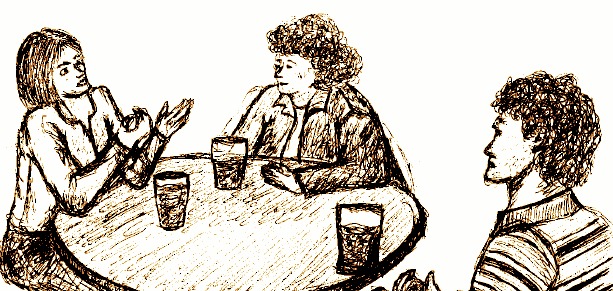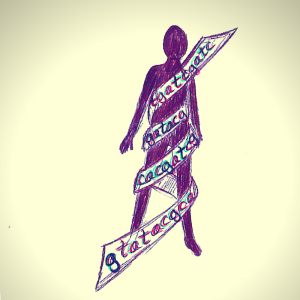
The pub is a home promising lively discussion and an ideal place to dwell on the important issues in life. Where better to go on a Thursday night in mid-February to debate the ethics and use of genetic testing.
‘Will genomic data be used or abused?’ was a debate organized by the charity Genetic Alliance UK, an umbrella organization representing over 180 patient groups to support those affected by genetic conditions. The event was part of GenomeSeqWeek, a week of events to mark the launch of their Patient Charter, ‘Genome sequencing: What do patients think?’ and increase public dialogue on the topic of genome sequencing.
The debate was chaired by the charity’s director, Alastair Kent OBE, and was contributed to by Dr Beth Thompson, Policy Advisor at the Wellcome Trust, and Professor Nazneen Rahman, Head of the Division of Genetics and Epidemiology at The Institute of Cancer Research.
The 100,000 Genomes Project
Around Christmas time in 2014 came the announcement that the National Health Service will lead the way in delivering the 100,000 Genomes Project, an initiative that will transform diagnosis and treatment for patients with cancer, rare diseases and infectious diseases.
“The project has the potential to transform the future of healthcare. It could improve the prediction and prevention of disease, enable new and more precise diagnostic tests, and allow personalisation of drugs and other treatments to specific genetic variants.”
Beginning soon, the 100,000 Genomes Project is the first to sequence whole genomes on this scale, but raises ethical issues that need to be discussed in consultation with both patients and the public. For example, an individual could have their genome sequenced in the hope of receiving a diagnosis for their condition, but at the same time could unexpectedly find out something else about their health.
Concerns have also been raised about whether having so much information about an individual could reveal their identity and who would be able to access the sequence data. All of these issues have led us to question whether genetic data is actually any different to other types of health data, and if it should be given special status.
Advances in the field of diagnostics mean that the laws need to modernize along with it. “Health and genetic data are treated sensitively,” explained Beth, “with laws impinging on how the data is used.” Although Beth admits that the changes in EU framework are worrying, she is optimistic as the laws are currently under revision.
Wouldn’t you want to know?
In the context of ‘do I or don’t I’, ultimately it is your choice. “One should think along the lines that genome sequencing is basically just another test for diagnosis,” stated Nazneen, “You get specific information as well as the extras. It’s the extra material that we need to think about.”
Nazneen was referring to the situation where genome sequencing can reveal genes responsible for conditions other than the one being looked for in the first place. Although the crowd had mixed feelings whether they’d want to know, Nazneen confirmed that patients will always be informed, if doctors believe the finding to be clinically relevant, because “our overall aim as health practitioners is for a healthy society.” Yet returning results of uncertain clinical significance is still something that we need to think about.
One should think along the lines that genome sequencing is basically just another test for diagnosis.
Professor Nazneen Rahman
Institute of Cancer Research
Whether you are willing or not to have your genome sequenced often comes down to your current health status. If you are healthy, you feel no need, as “the predictive power of the test is virtually zero,” explained Nazneen. However, another person living with a genetic condition, or who has a family history of cancer, might consider it because they are concerned that the condition could be passed down to future generations.
The three debaters warned about companies such as 23andMe, who supply genetic tests for a fee of £125 that can be ordered online and posted straight to your home. You receive interesting information, but in the UK this is based purely on ancestry, rather than medical information related to the prediction and prevention of disease.
Where do you draw the line?
 The event attendees were worried about insurance companies and people identities being stolen. The perplexing warren of insurance and health needs to be understood before deciding whether to have your genome sequenced.
The event attendees were worried about insurance companies and people identities being stolen. The perplexing warren of insurance and health needs to be understood before deciding whether to have your genome sequenced.
Alastair reassured us that you don’t have to declare your results, if you have a predictive genetic test, because there’s no guarantee that you’ll develop the condition. It only shows your potential risk.
However, the one exception is the predictive test for Huntington’s disease. If you carry the gene, you’ll definitely develop the condition. Consequently, you need to tell insurance companies, if you are taking out a life insurance policy of over £500,000.
In terms of stealing your identity, there are far easier means to do so. Just think of all the data floating around on the internet.
Do we want to know our future?
To have your genome sequenced is a personal decision. There is no right or wrong decision here: it simply depends on you philosophy of life. We all know how to live healthy lives; yet how many of us follow the perfect regime?
Some felt that with the genome sequenced our fate will be decided, and were against having that dictate how we live our lives. But you need to consider that the interaction between genes and environmental factors limits the degree of certainty, so you can’t ever by sure if you’ll get the disease or not.
On the other hand, there is hope. You have a chance to change the way you live your life, making perhaps healthier choices, and you can take preventive steps to prolong your life.
Would you share your data for the ‘good of science’?
More data means more knowledge, and to aid scientific progress it is important to share. Only by sharing our data can we transform the way medical research is conducted. This includes commercial companies because they can use the data to invest in the research, development and manufacture of new drugs and diagnostic tests.
The genomic revolution has started
Genome sequencing will eventually become part of the existing health framework. We’ll need to increase our understanding of how to use the technology and how the information will be used in healthcare because the “costs need to be justified,” said Beth.
This is just the start of an ongoing conversation, as ethical and societal challenges will grow. Alastair brought the night to a close with “The genetic revolution has started. We’re standing at a top of a volcano that is about to erupt. The question is how will we engage with it?”
Alanna Orpen
Latest posts by Alanna Orpen (see all)
- Chewbaaka migrated from North America - 4th May 2016
- The genetic revolution has started, so what does this mean for me? - 3rd March 2015
- Family Farming: “Feeding the world, caring for the earth” - 16th October 2014
Comments